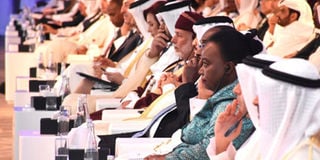CS Monica Juma attends Doha forum on peace

Foreign Affairs Cabinet Secretary Monica Juma (third right) at the Doha forum on security, peace building and economy. PHOTO | COURTESY
What you need to know:
The Doha forum kicked off Saturday, attracting over 1,700 participants to the venue and virtually.
Foreign Affairs Cabinet Secretary Monica Juma is in Doha to attend a global forum on security, peace building and economy.
The Doha forum kicked off Saturday, attracting over 1,700 participants to the venue and virtually.
The Emir of Qatar, Sheikh Tamim Bin Hamad Al Thani officially opened the conference with calls for participants who include heads of state and stakeholders to come up with solutions to global challenges, while respecting human rights and dignity.
He stressed the need for diplomacy and open dialogue in the context of the blockade on Qatar.
Ecuador President Lenin Moreno also called on states to respect diverse opinions in dialogue.
The conference is also attended by the President of the United Nations General Assembly María Fernanda Espinosa, who reiterated the need to increase the inclusivity of women in peace building.
The two-day Doha Forum will examine trends in conflict prevention and resolution as well as explore traditional and non-traditional ways of security.
Participants will also discuss cybersecurity, food security, new dynamics of power and other issues.
The forum brings together political figures, thought leaders, governmental agencies, and civic society organizations with the aim of facilitating dialogue about conscious policymaking.
'ALIGN INTERESTS'
At a parallel session to discuss facilitating peace in the Sahel, CS Juma said that there were striking similarities between the situation in the Sahel region and the Horn of Africa.
Ms Juma said there have been little commensurate international force to end the crises in the two regions.
"Missions that have been deployed to the region do not have the resources while the local governments themselves are not able to provide resources thus lack of capacity," Ms Juma said.
She also said the situation has been complicated by the growing interest by the intervening countries.
"There is need to align these interests to the needs of the people on the ground," she said.
On alternatives to militarisation, Ms Juma said dialogue should be about the ability of a state and its partners to provide and restore services and to provide livelihoods to the people.
"Only when the people are empowered will dialogue work," she said, adding that management of diversity would eliminate issues to do with exclusion.





